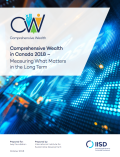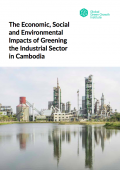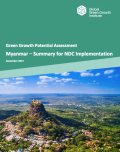
The report Comprehensive Wealth in Canada 2018: Measuring what matters in the long term tries to measure the comprehensive wealth in Canada. Comprehensive wealth in this report means the country's produced, natural, human, financial and social capital. The findings of the report suggest that the concerns for Canada's future in terms of comprehensive wealth is well-founded as the analysis demonstrates that the foundation of the GDP growth is fragile.

The report The Economic, Social and Environmental Impacts of Greening the Industrial Sector in Cambodia provides evidence on the economics and social benefits of greening the industrial sector of Cambodia based on a robust economic analysis that included a quantitative study and integrated modeling and scenario analysis.
Carbon pricing instruments come in many shapes and forms; in this report, IISD analyzes the possible development of innovative approaches to linking carbon pricing instruments and considers how carbon pricing club members could reduce emissions while keeping costs low.
This report, based on research from the Nature Conservancy, the University of Minnesota and 11 other organizations, explores whether it is possible to achieve a future where the needs of both people and nature are advanced. It projects the state of the world in 2050 if development progresses in a “business-as-usual” fashion, and what it would look like if a sustainable path was implemented with a series of fair-minded and technologically viable solutions to the challenges that lie ahead.

An assessment was conducted by the Global Green Growth Institute (GGGI) to identify Myanmar's specific opportunities and barriers in relation to green growth in six sectors. This summary report provides an overview of recommendations relevant for its Nationally Determined Contribution (NDC) implementation, focusing on related recommendations for agriculture, forestry and land use, energy, and education and governance.
